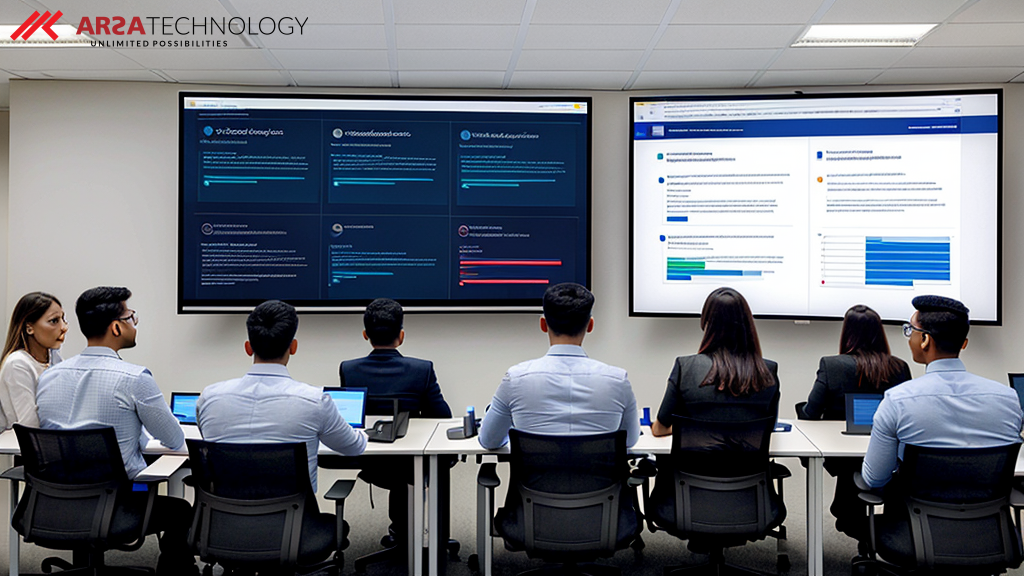Introduction: Overcoming Slow Digitization of Citizen Services in the Government Sector
Government agencies worldwide face an escalating demand for more efficient, accessible, and secure citizen services. Yet, many remain encumbered by legacy systems and manual processes, leading to a significant bottleneck: the slow digitization of critical public services. This challenge is particularly acute in areas requiring extensive record-keeping and precise documentation, such as legal and medical dictation transcription. The reliance on manual transcription is not only time-consuming and costly but also prone to human error, hindering the speed and accuracy with which essential information is processed and shared. This directly impacts everything from judicial proceedings and public safety to healthcare administration and citizen support.
The imperative to modernize is clear. Government entities need robust, scalable, and secure technological solutions that can transform spoken words into actionable data with unparalleled accuracy. This is where advanced Speech-to-Text (STT) APIs become indispensable. For organizations currently using outdated or underperforming STT solutions, or those still grappling with entirely manual methods, migrating to a superior platform like ARSA Technology’s Speech-to-Text API is not just an upgrade—it’s a strategic necessity. This guide outlines the compelling reasons and practical considerations for government agencies to make this pivotal transition, ensuring faster, more reliable, and more secure citizen service delivery.
The Critical Need for Modern Speech-to-Text in Government Operations
The implications of slow digitization extend far beyond mere inconvenience. In the government sector, particularly for legal and medical dictation transcription, delays and inaccuracies can have profound consequences. Court proceedings can be prolonged, medical records can be misfiled, and critical public safety communications can be misinterpreted. The volume of spoken information generated daily in these fields is immense, making manual transcription an increasingly unsustainable practice. Existing, less advanced STT solutions often fall short in specific governmental contexts, struggling with:
- Domain-Specific Terminology: Legal and medical fields use highly specialized jargon that generic STT models frequently misinterpret.
- Accent and Dialect Variation: Serving diverse citizen populations requires an STT solution capable of understanding a wide range of speech patterns.
- Security and Compliance: Handling sensitive citizen data demands stringent security protocols and adherence to regulatory frameworks.
- Scalability: Government operations require an API that can handle fluctuating, often high, volumes of transcription requests without performance degradation.
Migrating to a purpose-built, high-performance Speech-to-Text API addresses these pain points directly. It empowers government agencies to accelerate the processing of vast amounts of audio data, from court hearings and police interviews to doctor’s notes and public inquiries. The result is not just operational efficiency but a fundamental enhancement in the quality, speed, and accessibility of citizen services, directly contributing to the overarching goal of comprehensive digital transformation.
ARSA Technology’s Speech-to-Text API: A Foundation for Government Modernization
ARSA Technology understands the unique demands of the public sector. Our Speech-to-Text API is engineered to deliver exceptional accuracy, reliability, and security, making it an ideal choice for government agencies looking to modernize their operations. Unlike general-purpose transcription tools, our highly accurate transcription API offers specialized capabilities that are critical for legal and medical dictation transcription.
Key advantages that make ARSA’s API a superior choice for government include:
- Industry-Leading Accuracy: Leveraging advanced AI models, our API excels at understanding complex, domain-specific terminology, ensuring that legal and medical dictations are transcribed with minimal errors. This precision is paramount where every word can hold significant weight.
- Robust Multilingual Support: In a globalized world, government services must cater to diverse linguistic needs. Our API supports a broad spectrum of languages and dialects, enabling agencies to serve all citizens effectively and inclusively.
- Scalability and High Performance: Designed for enterprise-grade applications, ARSA’s API can seamlessly handle massive volumes of audio data, ensuring consistent performance even during peak demand periods. This means no more bottlenecks or delays in processing critical information.
- Enhanced Security Features: Data privacy and security are non-negotiable for government operations. Our API is built with robust security measures to protect sensitive citizen information, aligning with strict governmental compliance requirements.
- Seamless Integration: We prioritize developer experience, ensuring that our API is designed for straightforward integration into existing government IT infrastructures, minimizing development time and resources.
By choosing ARSA Technology, government agencies are not just adopting a new tool; they are investing in a strategic partnership that supports their digital transformation journey, enabling them to deliver more responsive, transparent, and efficient services to their constituents.
Key Considerations for a Successful Speech-to-Text API Migration
Migrating to a new API, especially one as critical as Speech-to-Text, requires careful planning and consideration. For government agencies, the process must be meticulous to ensure data integrity, security, and continuity of service. Here are the crucial factors to evaluate:
- Data Accuracy and Domain Specificity: The primary driver for migration is often improved accuracy. Evaluate how well the new API handles your specific vocabulary (legal terms, medical jargon, regional accents). ARSA’s API is continuously refined to offer superior accuracy across diverse linguistic contexts, which is vital for precise legal and medical transcription.
- Security and Compliance: Government data is highly sensitive. Ensure the new API provider adheres to rigorous security standards (e.g., data encryption, access controls) and can support compliance with relevant regulations (e.g., GDPR, HIPAA, local government data protection acts). ARSA Technology prioritizes robust security protocols to safeguard your information.
- Scalability and Performance: Assess the API’s ability to handle current and future transcription volumes without latency or degradation. Government agencies often experience fluctuating demands, so a highly scalable and performant solution like ARSA’s is essential to avoid service interruptions.
- Multilingual Capabilities: If your agency serves a diverse population, the API’s support for multiple languages and dialects is critical for inclusivity and accessibility. ARSA’s comprehensive multilingual support ensures no citizen is left behind.
- Ease of Integration and Developer Support: A smooth migration hinges on how easily developers can integrate the new API into existing systems. Look for clear documentation, responsive support, and an intuitive API design. ARSA Technology is committed to providing an excellent developer experience, simplifying the integration process.
- Cost-Effectiveness and ROI: Beyond the initial investment, consider the long-term cost savings from reduced manual effort, improved accuracy, and faster processing times. A robust STT API can significantly reduce operational expenses and free up resources for other critical initiatives.
Addressing these considerations proactively will pave the way for a successful migration, ensuring that your agency reaps the full benefits of advanced speech-to-text technology.
A Phased Approach to Seamless Migration with ARSA Technology
Migrating to ARSA Technology’s Speech-to-Text API can be a streamlined process when approached systematically. Here’s a phased strategy designed to ensure a smooth transition for government agencies:
- Phase 1: Assessment and Planning
- * Identify Current Challenges: Document the specific pain points with your existing transcription methods (manual or legacy API), focusing on accuracy, speed, cost, and security.
- * Define Requirements: Clearly outline your agency’s needs for accuracy (especially for legal and medical terminology), language support, security, scalability, and integration points.
- * Resource Allocation: Identify the internal teams (developers, IT security, legal/compliance) that will be involved in the migration and allocate necessary resources.
- * Pilot Project Scope: Select a specific, manageable use case (e.g., transcribing a particular type of legal dictation or a subset of medical notes) for an initial pilot.
- Phase 2: Integration Strategy and Development
- * API Exploration: Developers should familiarize themselves with ARSA’s Speech-to-Text API capabilities. To see the API in action and experiment with its features, demo the Speech-to-Text API. This interactive playground allows for immediate testing of transcription quality and response.
- * System Design: Plan how ARSA’s API will integrate with your existing applications, data workflows, and storage solutions. Consider authentication, data flow, and error handling.
- * Development and Configuration: Begin coding the integration. This involves setting up the necessary connections and configuring the API parameters to meet your specific needs, such as language models or output formats.
- * Security Implementation: Ensure that all data transmission to and from the API is secure, adhering to your agency’s data protection policies and relevant government regulations.
- Phase 3: Testing and Validation
- * Functional Testing: Verify that the API correctly transcribes various types of audio, including different speakers, accents, and background noises relevant to your government context.
- * Accuracy Testing: Compare the API’s output against human-transcribed benchmarks, especially for legal and medical dictations, to confirm it meets your required accuracy thresholds.
- * Performance Testing: Stress-test the integration to ensure it can handle expected volumes of transcription requests without performance degradation or latency issues.
- * Security Audits: Conduct thorough security audits to confirm that data remains protected throughout the transcription process and that all compliance requirements are met.
- * User Acceptance Testing (UAT): Involve end-users (e.g., legal professionals, medical staff) from the pilot project to gather feedback and ensure the solution meets their operational needs.
- Phase 4: Deployment and Optimization
- * Phased Rollout: Implement the new Speech-to-Text solution in stages, starting with the pilot project and gradually expanding to other departments or use cases. This minimizes risk and allows for continuous learning.
- * Monitoring and Feedback: Continuously monitor the API’s performance and accuracy post-deployment. Establish feedback channels for users to report any issues or suggest improvements.
- * Iterative Refinement: Use feedback and performance data to fine-tune the integration, optimize configurations, and explore advanced features of ARSA’s API to maximize its value. This might include integrating with other AI services, such as utilizing our generate natural voice responses with our TTS API for interactive citizen support systems.
By following this structured approach, government agencies can confidently migrate to ARSA Technology’s Speech-to-Text API, unlocking unprecedented levels of efficiency and accuracy in their digital services.
Realizing Tangible Benefits: ROI for Government Agencies
Migrating to ARSA Technology’s Speech-to-Text API offers a compelling return on investment (ROI) for government agencies, translating directly into improved citizen services and operational excellence. The benefits are multifaceted, impacting financial efficiency, service delivery, and strategic positioning.
- Significant Cost Reduction: Automating legal and medical dictation transcription drastically reduces the need for manual transcribers, leading to substantial savings in personnel costs. Furthermore, faster processing means less time spent on administrative tasks, freeing up valuable resources.
- Enhanced Operational Efficiency: With high-accuracy, real-time transcription, government workflows become significantly more agile. Documents are processed faster, information is disseminated quicker, and decision-making is accelerated. This efficiency directly addresses the pain point of slow digitization, allowing agencies to serve more citizens in less time.
- Improved Accuracy and Data Quality: Human transcription is prone to errors, which can have severe consequences in legal and medical contexts. ARSA’s advanced AI ensures a higher degree of accuracy, leading to more reliable records, reduced rework, and enhanced data integrity.
- Greater Accessibility and Inclusivity: Multilingual support and the ability to convert spoken words into text make government services more accessible to a broader range of citizens, including those with hearing impairments or non-native speakers. This fosters greater inclusivity and equity in public service delivery.
- Faster Information Retrieval and Analysis: Once audio data is accurately transcribed into text, it becomes searchable, analyzable, and integratable with other digital systems. This unlocks new possibilities for data-driven insights, allowing agencies to identify trends, improve policies, and respond more effectively to public needs.
- Future-Proofing Digital Infrastructure: Adopting a modern, scalable API like ARSA’s positions government agencies at the forefront of digital innovation. It creates a flexible foundation for integrating other advanced AI capabilities in the future, such as using our generate natural voice responses with our TTS API for automated citizen communication or AI-powered virtual assistants. This strategic move ensures long-term relevance and adaptability in a rapidly evolving technological landscape.
Ultimately, the migration to ARSA Technology’s Speech-to-Text API is an investment in the future of government services—one that promises not only immediate operational gains but also a pathway to more responsive, efficient, and citizen-centric public administration.
Conclusion: Your Next Step Towards a Solution
The journey towards fully digitized and highly efficient government services is both challenging and rewarding. For agencies grappling with slow digitization, particularly in critical areas like legal and medical dictation transcription, the path forward is clear: embrace advanced, secure, and accurate Speech-to-Text technology. ARSA Technology’s Speech-to-Text API offers a robust, scalable, and highly accurate solution designed specifically to meet the stringent demands of the public sector.
By migrating to our platform, government agencies can transcend the limitations of manual processes and legacy systems, unlocking unprecedented levels of operational efficiency, data accuracy, and citizen accessibility. This strategic move not only optimizes current workflows but also lays the groundwork for future innovations, ensuring that public services are not just modernized but truly future-proofed. The time to act is now, transforming challenges into opportunities for a more responsive and effective government.
Ready to Solve Your Challenges with AI?
Discover how ARSA Technology can help you overcome your toughest business challenges. Get in touch with our team for a personalized demo and a free API trial.







